Rewire 2024: The Hague’s experimental music festival that makes music and community more real
There's a reason why Rewire is becoming Europe's most talked about experimental city festival
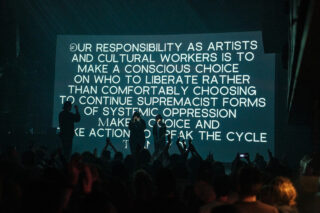
There's a reason why Rewire is becoming Europe's most talked about experimental city festival
One of the great joys of a city festival like The Hague’s Rewire is the people watching, as you spot groups of friends with wristbands grabbing beers in Grote Markt (the city centre’s market square) or couples tucking into churros on Scheveningen beach during the year’s first sliver of sun. You wonder if the gorpcore club kids stretching their knees over there are recovering from Hi-Tech last night, or if the tall Swedes in Sunn O))) t-shirts were also the guys lighting spliffs in the dark during Autechre‘s set.
And Rewire is truly an urban festival, spreading itself over 25 venues in the centre of the Netherlands city. You move from impressive concert halls like Amare to small theatres a few streets over, then to a Lutheran church as the sun sets, dodging passing mopeds and bikes who rubberneck at the long queue inexplicably forming outside of another impressive church. “Is this for the Rewireless?” a suited woman asks as she pushes her bike past, eyes scanning the crowd. She’s also enjoying the people watching.
Rewire specialises in music off the beaten path. It’s broadly experimental, and it’s not just electronic. The packed night programme features jazz, drone, ambient, classical, alt-pop, metal, folk and hip-hop – though the festival starts around 10pm for some, as club music takes over. Artists come to take risks. Many present one-offs, combining music with visual art or collaborating on weird projects that wouldn’t usually pull such a crowd.
During the day, figureheads like Jlin and Jenny Hval give talks. You’re encouraged to engage with the city and the art with a collection of commissioned ‘audio walks’. Connected art exhibits pop up all over the city to give more reason to explore. A solid film programme rounds out a programme that rallies for art in all its forms.
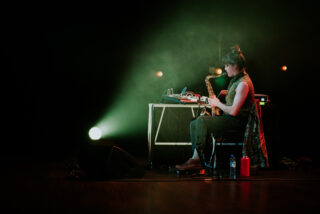
As is natural for a festival keen to experiment, today’s highlights all force you into different modes of listening, from intense focus to dreamy dissociation. I feel like my brain has been in the bath by bedtime.
The day for me starts with LA electroacoustic saxophonist and live wind synthesist Cole Pulice. Their instrument is fed through effects pedals, allowing them to catch a note in an endless drone, or use it to trigger digital bells and gongs. The bulk of their set is formed from the 20-minute piece ‘If I don’t see you in the future, I’ll see you in the pasture’. Here, it’s elongated with patient drone work. The live mix is less spacious and uplifting than the dreamlike recorded version, which makes the resonant drone notes more claustrophobic. Still, the effect is hypnotic. You zone in and out around strained and breathy sax runs, as notes stretch on for minutes at a time.
Julia Holter‘s new record Something in the Room She Moves, is about embracing love in the present. Her set is formed from gorgeous moments of stillness and spontaneity. Dev Hoff’s fretless bass work embodies that spirit on songs like ‘Evening Mood’, while Tashi Wada’s synths and Beth Goodfellow’s paired-back percussion carry the lushness of the record even without the lush bed of woodwinds. It’s Holter’s first stop of the tour. The band are still figuring out some transitions without the accompanying sax and flute. Still, it’s startling when Julia’s voice and the surrounding instrumentation lock together.
This is the first of many brutal clashes. Chiquimamani-Condori and the Necks have to be skipped. The small size of some venues mean hefty queues. Timings have to be well planned out.
Over at Grote Kerk, the stunning 13th-century church in the centre of The Hague, Autechre perform in total darkness. You understand why they’ve made it their calling card within minutes. With sound blasting and light dimmed, the surrounding crowd drift away. You cycle through recent thoughts – for me, that’s flight stress, timetable planning and work worries. Once you let go of those thoughts, the world they create becomes visible. Their set moves from patient ambient tech to visceral and metallic drum manipulation. There’s depth and detail. The space around you seems to shift every few moments. An hour disappears.
We jog over to Lutherse Kerk church for One Leg One Eye, the solo project of Lankum member Ian Lynch, who has twenty minutes left. Moving from the intense rhythm mastery of Autechre to this still and apocalyptic set is disorienting. Sat in the balcony seats in this grand building, hearing an ancient sounding folk tune reverberate and decay, I have my first cry of the weekend.
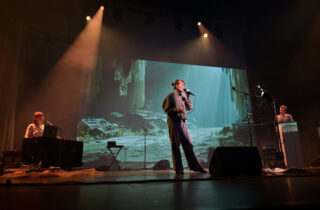
Music happens in your imagination. That’s the rough theme connecting today’s acts. It’s there in Brìghde Chaimbeul’s striking and minimal Scottish handpipe performance at Lutherse Kerke, where changes in time signature and groove feel more implied than strictly stated. It’s there in ML Buch’s midi guitar simulacra (at least before she picks up her Stratocaster), and within her odd impressionistic lyrics, which can make you cry without feeling legible on a first listen.
It’s especially there in Jenny Hval’s performance of I Want To Be A Machine, which grapples with the devaluing and derealising of art. It’s a mix of song, meta commentary and essay. There’s a diffuser on stage, wafting what smells like lemongrass and patchouli into the stalls. “Smells and music are invisible, and only exist in the mind,” Hval says. She plainly criticises Spotify and it’s CEO Daniel Ek for their €100 million investment in military surveillance AI technology, drawing parallels between the control they already have over art.
Admittedly, some of the dance beats fall slightly flat, but Hval is an ideas artist, and this set is full of them. It grapples with the ways that art, community and culture are made less real, and the effect that has on our ability to resist and connect.
At Rewire, I feel connected. I’m connected when listening to Brìghde Chaimbeul’s slow-moving compositions as they bounce around the church. I’m connected listening to ML Buch sing, “You’re working it out” on a loop. I’m connected chatting to two people in line, as they tell me about the stress of their studies and a tricky house move. The festival makes music and community more real.
Aunty Rayzor doesn’t fit neatly into that ‘music happens in your imagination’ theme, but I have to mention her, as her set is a clear highlight. The Nigerian MC dominates a packed midnight set, bringing incredible energy and enthusiasm.
She’s backed by a dizzying collection of beats, largely from her album Viral Wreckage, which balance fun and intensity. The crowd is hyped. She keeps that momentum up by dancing with us, making call and responses, and just generally being a joy to watch. At one point, she pulls a lanky dude up on stage to grind on.
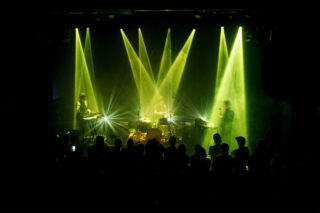
The last day brings with it a few technical difficulties. Bristol’s Tara Clerkin Trio start late because of a busted jack. Astrid Sonne is hampered by a faulty sampler. Nailah Hunter has to adjust to a missing harp sting. The computers completely fail during Oneohtrix Point Never’s set. These problems are par for the course at a festival, but they’re exaggerated when so many of these performances rely on building tension and mood. The likelihood of something going wrong when working in styles outside of traditional pop also increases. That’s not to mention the practical factors impacting all acts; that Nailah Hunter can transport her harp globally is impressive enough.
Thankfully, none of these issues really matter. Tara Clerkin Trio impress with their abstract and explorative jams, which once again have your imagination buzzing. Astrid Sonne’s classical-informed alt-pop is as captivating as on record. It’s refreshing just to hear someone playing the hell out of the viola over an ominous beat, but her latest batch of songs have such confidence, so it’s thrilling to hear them expanded in real-time with live cello and violin. There’s an eerie intimacy to the set that isn’t extinguished by tech that won’t play ball.
Nailah Hunter’s Lovegaze is an early highlight from this year, and its high-fantasy approach to harp-backed songwriting works wonders in the live setting. “I dream of beheadings/And goose feather bedding on fire,” she sings on ‘Into the Sun’, in a register so heavenly that the horrifying image barely registers.
And finally, there’s OPN, whose varied and unorthodox career makes him suited to quasi-headliner status. He brings his new record, Again, to the impressive Amare concert hall. That record is already a sketchbook of his past styles and approaches, albeit one written in chaotic scraps. It makes for an ideal summation of what’s come before. Joining him on stage is a puppet diorama doppelganger, filmed live and blown up on the screen behind the stage. The puppet plays reimagined sounds of Daniel Lopatin’s youth. It’s an intense set of jumbled trance, synth soundscapes, proggy rock and plunderphonics. The past is spat out as a stream of competing thoughts and ideas, until moments of catharsis break through. He closes with sleeper hit ‘Chrome Country’, a track formed completely out of those moments of clarity. You cry, and you don’t know why.
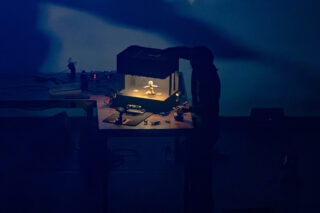
Each morning, I’m woken up by the bells at Grote Kerk, apart from one where it’s the noise of a street protest, which has become common here as well as all over the Netherlands. Later, we find out that Greta Thunberg has been arrested during a climate demonstration. It’s hard not to think about the state of the world in general, but especially at somewhere like Rewire. Many artists share their solidarity with Palestine, including Julia Holter and Jenny Hval, who both also mention writer’s block. How can you write songs at a time like this? And yet, people do. Art keeps getting made, despite it getting harder to do so. People keep connecting even when the avenues for doing so seem to close down each day. I’m walking through the town centre, people-watching again, wondering who was at the festival now the wristbands have been taken off, wondering where they’re going, where we go from here.
Lead image photographed by Alex Heuvink